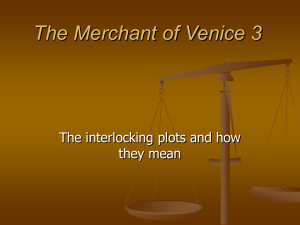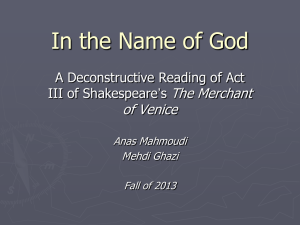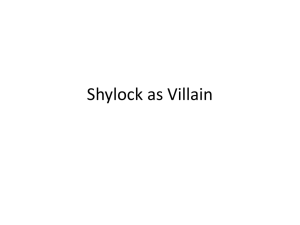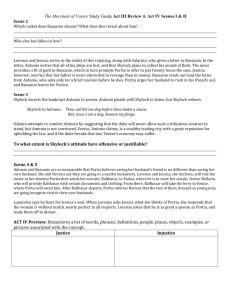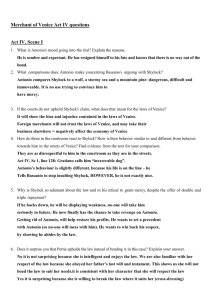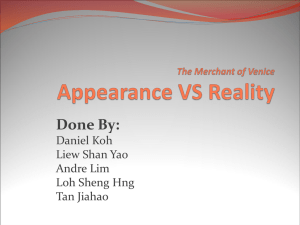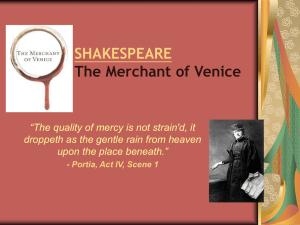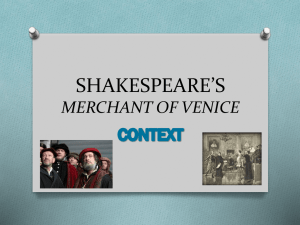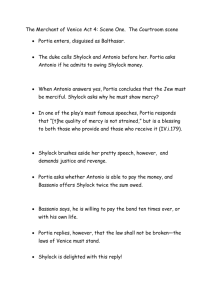The Merchant of Venice Study Questions
advertisement
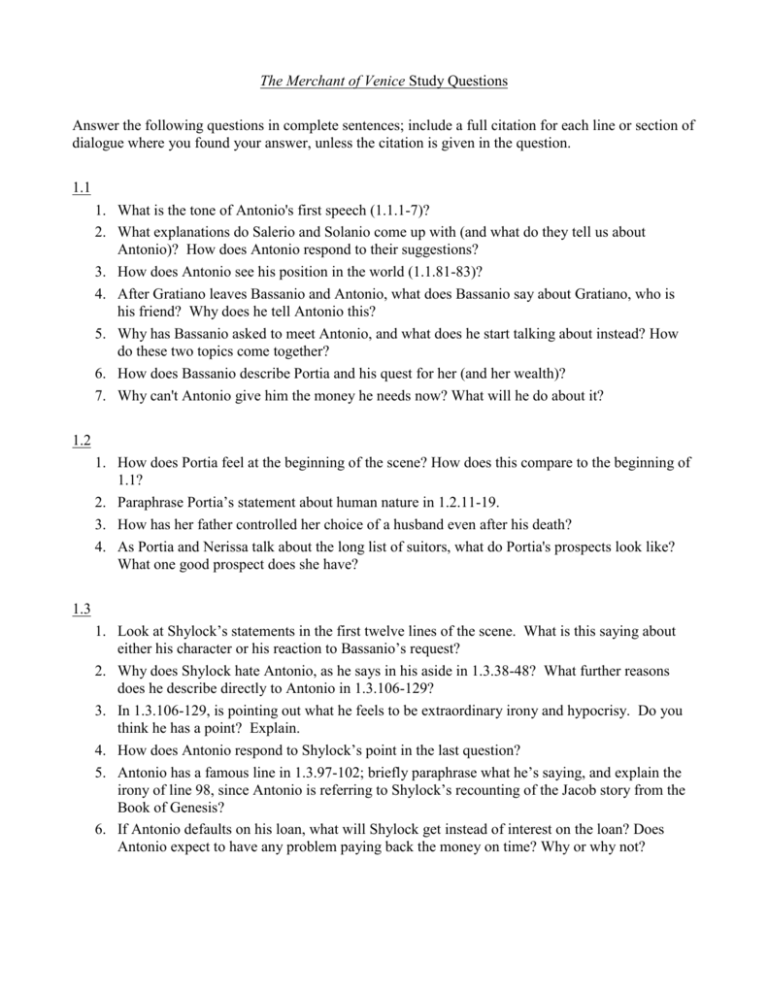
The Merchant of Venice Study Questions Answer the following questions in complete sentences; include a full citation for each line or section of dialogue where you found your answer, unless the citation is given in the question. 1.1 1. What is the tone of Antonio's first speech (1.1.1-7)? 2. What explanations do Salerio and Solanio come up with (and what do they tell us about Antonio)? How does Antonio respond to their suggestions? 3. How does Antonio see his position in the world (1.1.81-83)? 4. After Gratiano leaves Bassanio and Antonio, what does Bassanio say about Gratiano, who is his friend? Why does he tell Antonio this? 5. Why has Bassanio asked to meet Antonio, and what does he start talking about instead? How do these two topics come together? 6. How does Bassanio describe Portia and his quest for her (and her wealth)? 7. Why can't Antonio give him the money he needs now? What will he do about it? 1.2 1. How does Portia feel at the beginning of the scene? How does this compare to the beginning of 1.1? 2. Paraphrase Portia’s statement about human nature in 1.2.11-19. 3. How has her father controlled her choice of a husband even after his death? 4. As Portia and Nerissa talk about the long list of suitors, what do Portia's prospects look like? What one good prospect does she have? 1.3 1. Look at Shylock’s statements in the first twelve lines of the scene. What is this saying about either his character or his reaction to Bassanio’s request? 2. Why does Shylock hate Antonio, as he says in his aside in 1.3.38-48? What further reasons does he describe directly to Antonio in 1.3.106-129? 3. In 1.3.106-129, is pointing out what he feels to be extraordinary irony and hypocrisy. Do you think he has a point? Explain. 4. How does Antonio respond to Shylock’s point in the last question? 5. Antonio has a famous line in 1.3.97-102; briefly paraphrase what he’s saying, and explain the irony of line 98, since Antonio is referring to Shylock’s recounting of the Jacob story from the Book of Genesis? 6. If Antonio defaults on his loan, what will Shylock get instead of interest on the loan? Does Antonio expect to have any problem paying back the money on time? Why or why not? After Act 1 1. Consider Antonio’s behavior and dialogue in both 1.1 and 1.3. Why does he treat Shylock the way he does? Is it justified? 2.1 1. Paraphrase what Portia tells the Prince of Morocco in 2.1.17-22. 2. What happens to Portia’s suitors who choose the wrong casket? 2.2 1. What does Launcelot want from Bassanio? 2. Why doesn't Bassanio want to take Gratiano with him to Belmont? 2.3 1. What does Jessica ask Launcelot to do for her? What is she planning to do? 2. In what way(s) are the situations and dialogue of Jessica and Launcelot similar? 2.4 1. What are Lorenzo and his friends planning for that evening? 2. Twice in this scene, Lorenzo calls Jessica “gentle” (2.4.21 and 2.4.37); explain how this might be a pun on the word “gentile,” which is a term for a Christian/non-Jew. 2.5 1. Where is Shylock going to dinner? Why doesn’t he want to go? Why was he invited to this dinner? 2. Why is Shylock happy that Launcelot is now working for Bassanio? 2.6 1. What is Jessica’s disguise for her escape from her father's house? 2. What does she take with her? What is she carrying it in? 2.7 1. What are the three caskets made of? What message does each one have outside? 2. Which casket does the Prince of Morocco choose? What reasoning led him to that choice? What reasoning led him to not choose either of the other two? 3. Paraphrase the poem that the Prince of Morocco finds in the casket he chooses. 4. What is Portia's response after his departure? Why do you think 2.7.80 is often cut out of modern productions of the play? 2.8 1. How, according to Solanio, did Shylock respond to his daughter's departure? 2. How, according to Salerio, did Antonio respond to Bassanio's departure? 3. Is it possible either account isn’t entirely accurate? Why might gossip skew these accounts on purpose? 4. What’s the news about Antonio’s ships? 2.9 1. Which casket does the Prince of Arragon choose? What reasoning led him to that choice? What reasoning led him to not choose either of the other two? 2. Paraphrase the poem that the Prince of Arragon finds in the casket he chooses. 3. Who is the next suitor going to be? How is he described? After Act 2 1. By process of elimination, we now know which casket has Portia’s picture in it. Why that one, instead of the others? 2. Did you guess which casket was the correct one before any of them were opened? If so, how did you guess? 3.1 1. What’s the word on Antonio’s ships? 2. Why does Shylock tell Antonio (indirectly) to look to his bond (3.1.39-44)? 3. What news does Tubal have from Genoa? What is the effect of Tubal’s alternating reports about Antonio and about Jessica? 4. What did Jessica use to pay for a monkey? Why is Shylock so upset about this particular item she traded? 3.2 1. Why does Portia want Bassanio to wait a day or two before choosing a casket? 2. Which casket does Bassanio choose? What reasoning led him to that choice? What reward does he get? Is that any surprise? 3. Remember that the inscription on the lead casket is "Who chooseth me must give and hazard all he hath" (2.7.9). Why is this inscription appropriate for preparing for marriage? Do you think this inscription is appropriate to Bassanio? Explain. 4. What does Portia say about the ring she gives Bassanio in 3.2.174-177? What does Bassanio say about the ring? 5. Who else is getting married? 6. Who shows up from Venice? 7. What news is contained in Antonio's letter? How does Bassanio tell Portia about Antonio? 8. What is rich Portia's response? How do you compare her wealth (now Bassanio's) with Antonio's or Shylock's? (Remember Shylock had to get help to loan three thousand ducats; Portia has no problem offering sixty thousand ducats.) 9. Read Antonio's letter carefully in light of his earlier attitude toward Bassanio. What is he asking of Bassanio? What is he trying to do to Bassanio? 3.3 1. What is the point of this scene between Shylock and Antonio? What does Antonio's last speech tell us about Antonio's chances of survival? 3.4 1. What reason does Portia give to Lorenzo for her departure with Nerissa? What does she send Balthazar to do? 2. What does Portia tell Nerissa they will be doing? 3.5 None After Act 3 1. What is the function of 3.1.47-65? Does Shylock see any differences between Christians and Jews? Explain your reaction to this speech, and explain if and how your view of Shylock (or any other characters) has changed as a result. 4.1 1. Before the trial proper begins, what does Antonio say the Duke has already tried to do (4.1.112)? 2. What does the Duke think Shylock is going to do (4.1.17-35)? What is Shylock's response? 3. Why is Shylock unwilling to show mercy? How does he respond to the Venetians and their call for mercy (4.1.91-102)? What is his ultimate claim (even "threat") in demanding justice (4.1.103-104)? 4. Who is Bellario (4.1.103-106 )? Why is he coming? 5. What is Shylock doing while the Duke and Nerissa are talking (4.1.122-123)? [Hint: Read the two or three lines that follow this.] 6. What is the message of Bellario's letter? Who does Balthazar claim to be? Who is Balthazar in reality? 7. As readers we have stage directions telling us that Nerissa and Portia enter in disguise? Does an audience seeing the play for the first time know who they are? Why or why not? 8. What, if anything, is significant about Portia's first question (4.1.176)? How might one use this line as the key to an interpretation of the play? 9. What is Portia's first judgment about the bond (4.1.180-187)? Why “must” Shylock then be merciful (4.1.187)? How does this discussion help us see the purpose and focus of the "quality of mercy" speech (4.1.179-200)? What religious message does the speech contain? What religion does the message come from? How likely is Shylock to respond favorably to it? 10. Why is it important that offers be made to pay Shylock the amount owed him and even more? 11. At 4.1.224-227 who has won? Why? Why does Portia continue to urge Shylock to take the money (as in 4.1.232 and 4.1.239-240)? 12. What is Antonio's response to his approaching death (4.1.259-276)? What is Antonio claiming in 4.1.268-272? 13. What do Bassanio and Gratiano say to Antonio (4.1.291-296 and 4.1.299-301)? How do Portia and Nerissa respond to them (4.1.297-298 and 4.1.302-303)? What sort of potential problem is brewing here? How does it relate to the play’s theme of the bonds of male friendship versus heterosexual/romantic love? 14. What happens at 4.1.316? How does the law begin to work against Shylock? How has his strategy for revenge backfired? 15. Why can't Shylock take the money now and leave (4.1.361-334)? What additional problem with the law does Shylock have at 4.1.341-357? Why does this law against an "alien" apply to Shylock? 16. How are the tables turned at 4.1.376? How does Gratiano respond to this request? How does the Duke respond? 17. What penalty does the Duke decree (4.1.383-385)? What clarification does Portia provide at line 386? What "mercy" does Antonio add (4.1.393-403)? Who, ultimately, is the big winner here? 18. Describe the different kind of mercy Shylock asks for (4.1.387-390); how does this bring the meaning of mercy into question? 19. Why are the rings that Portia and Nerissa want from Bassanio and Gratiano so important? How difficult is it for the women to get the rings? What is Antonio's role in this situation? 4.2 none After Act 4 1. Act 4 is the meeting of two worlds of Venice and Belmont. How do the values of each affect the other? 2. What problem remains to be resolved in Act 5? 5.1 1. What does the argument about the rings say to Portia and Nerissa about their husbands? What does it make you think about their husbands? 2. In this whole situation about the rings, do Bassanio and Gratiano have good reason to be upset with their wives? 3. What is Antonio's role in resolving it? 4. What news does Portia have for Antonio (5.1.294-296)? 5. Why, in the context of the play, is it proper only now that the marriages be consummated? After Act 5 1. What does the issue about the rings reflect two of the major themes of the play, revenge and mercy? After the Play 1. Use the definition of “The Other” to explain what Shylock is blamed for and why. Then, give examples from the play of any of the other characters commiting the acts or exhibiting the traits assigned Shylock. 2. What is justice? 3. Which should win out – law or mercy? 4. Does our legal system focus on rehabilitation, mercy, or revenge? Is our legal system effective? Could it be more effective if we focused on something else? “I can get you justice, I can get you revenge, or I can get you a pound of flesh—I can’t get you all three.” --Bill Witt, attorney 3. What’s 4. The poems in the caskets are in a meter different than iambic pentameter – why? After reading his poem, the Prince of Morocco comments in the same rhyme scheme and meter as the poem for two lines (2.7.75-76), then returns to blank verse, but the Prince of Arragon comments in his poem’s rhyme scheme and meter for six lines (2.9.76-81) and then exits without returning to blank verse. After Bassanio reads his poem, he returns to blank verse immediately. Do you think Shakespeare did this for a reason? Or is it just the way the play turned out, without any specific purpose? Explain. (Note here two different sets of oppositions in the play: Christian/Jew and Belmont/Venice, which can also be seen as inherited wealth/commercial wealth.)
